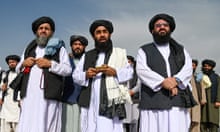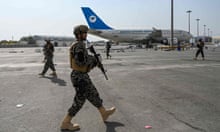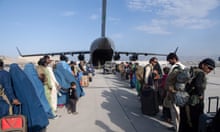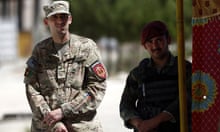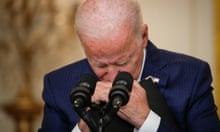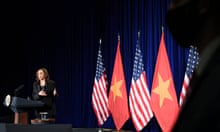The majority of America’s ambassadors to Afghanistan since the removal of the Taliban government have condemned the US approach to negotiating a troop withdrawal, warning it risked a return to “total civil war”.
Writing the day after a draft agreement was announced, the nine men, including a former deputy secretary of state, said they supported peace talks in Afghanistan.
But they warned the current approach risks spawning more violence and insecurity, because negotiators have cut the Afghan government out of discussions and have planned the departure of US troops before sealing a full peace agreement.
“We believe that US security and values, including support for women, require that a full troop withdrawal come only after a real peace,” said the open letter, published by the Atlantic Council.
“We must not yank so much support from our Afghan friends that they are unable to protect themselves or the chance to keep moving forward with a representative democracy.”
Adding to the political turmoil in Afghanistan, a presidential election is set for 28 September. It has been unclear if the election would go ahead, but the letter warned against the suggestion that the polling should be delayed if a deal with the US paves the way for inter-Afghan talks.
“Afghans deserve to determine their government and who will represent them in peace negotiations. For this to happen, there is a strong argument that presidential elections planned for September should go forward,” the ambassadors wrote.
Between them, the signatories have 12 years of experience at the US embassy in Kabul over the past two decades. They also include John Negroponte, the former deputy secretary of state and the first ever US director of national intelligence.
Only four ambassadors from the period since the 9/11 attacks and the subsequent US-backed removal of the Taliban government are missing from the list of signatories. One of them is the incumbent, and the other is the lead US envoy to peace talks, Zalmay Khalilzad.
After a year of negotiations, Khalilzad has reached a draft deal with the Taliban for a US troop withdrawal. But Afghan officials were excluded from the talks, and the draft deal was only shown to President Ashraf Ghani this week.
That decision, driven by the Taliban’s refusal to speak to officials they denounce as “puppets”, was unwise and damaging to the Afghan government, the ambassadors said. “Whether or not the United States wants or is willing to keep some forces engaged, we should not undercut the legitimate government in Afghanistan by keeping them out of negotiations.”
The draft withdrawal deal also does not define how Afghanistan should be governed once American troops have gone. Critics say that could set the stage for an intensified civil war.
Although US support has been critical to Afghan security forces, they are still several hundred thousand strong and backed up by militia which have been fighting the Taliban since before US troops first arrived. Most are likely to have a strong incentive to keep on fighting.
“There is an outcome far worse than the status quo, namely a return to the total civil war that consumed Afghanistan as badly as the war with the Russians, and something that could follow a breakdown in negotiations if we remove too much support from the Afghan state,” the letter said. “If the state totters, those with nasty memories of life under the Taliban will fight on.”
The deal would allow for an initial drawdown of nearly 5,000 US troops. In an interview with Afghanistan’s Tolo TV, Khalilzad declined to stay how long the remaining 8,500 troops could stay, but previous reports have suggested it would be well under two years.
In return, the Taliban will guarantee that the country will not be used by al-Qaida or other extremist groups as a base for attacks on the west. Critics question how that will be enforced if the US no longer has a military presence on the ground.
The agreement must be approved by Donald Trump before it can be signed, but the president has made little secret of his desire to extricate the US from its longest war as soon as possible.

